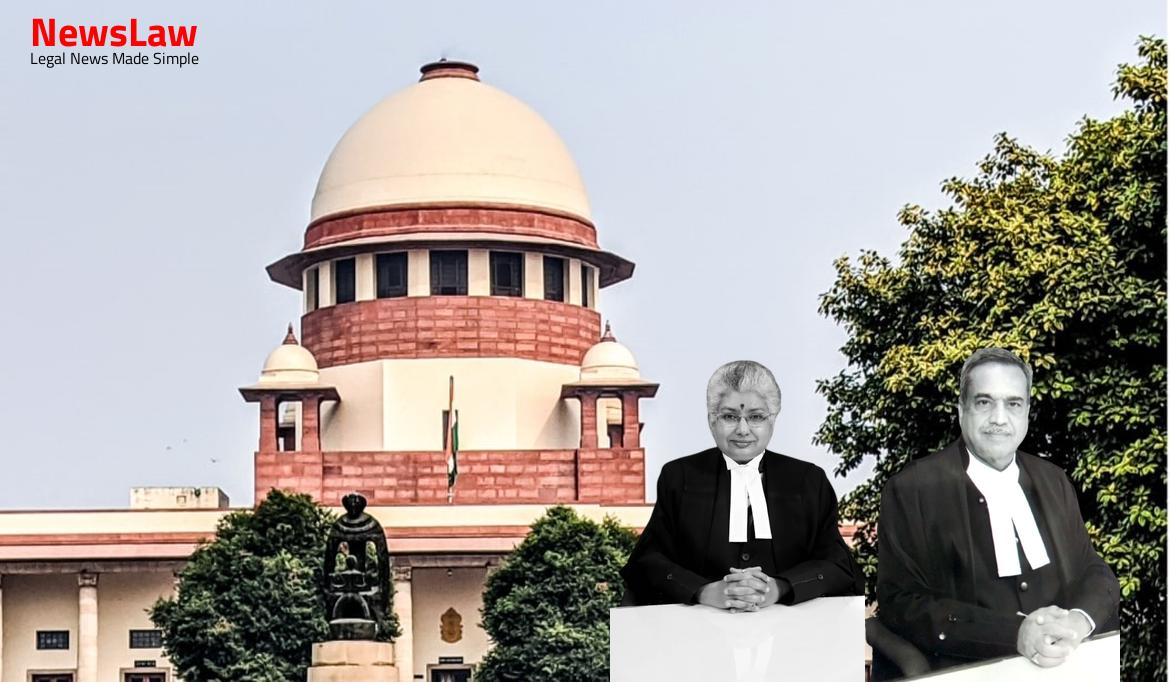Delve into the detailed legal analysis carried out by the Court in a recent case involving retroactive legislation under the Food Safety and Standards Act. The Court’s examination of the principles of beneficial amendments and reduced penalties sheds light on ensuring fairness in sentencing. Stay tuned to understand the nuances of the legal interpretation in this complex case.
Facts
- Appellant no. 2 was sentenced to undergo 3 months simple imprisonment along with a fine for violating Rule 32(c) and (f) of the Prevention of Food Adulteration Rules, 1955.
- The lab report indicated that the food articles were not adulterated, but lacked prescribed particulars on the packets such as complete address of the manufacturer and date of manufacturing.
- Appellant no. 1, along with appellant no. 2 and Amit Kumar Sarkar, was convicted under Section 16(1)(a)(i) read with Section 7 of the Act by the Trial Court.
- Appellant no. 2 and Amit Kumar Sarkar were sentenced to 6 months simple imprisonment and a fine of Rs.1,000/- each, while appellant no. 1 was fined Rs.2,000/-.
- Appellants’ plea that they did not manufacture the food articles, and instead Bose Confectionary, Calcutta did, was not accepted by the courts.
- The inspector filed a complaint under Section 16(1)(a)(i) read with Section 7 of the Act based on the findings against the appellants.
- The appeal of the appellants against the order of conviction and sentence by the Trial Court was dismissed by the District and Sessions Judge.
- The conviction of Amit Kumar Sarkar, the third accused in the case, was set aside and he was acquitted.
- In Revision proceedings, the High Court of Calcutta upheld the concurrent findings of conviction but reduced the sentence of appellant no.2 from 6 months to 3 months simple imprisonment.
- Brief facts of the case include the inspection of the shop/godown of the appellants by a food inspector and the purchase of samples of sugar boiled confectioneries for testing.
- Appellant no.1 was sentenced to pay a fine of Rs.2,000/- for the offenses related to the sale of adulterated food products.
Also Read: Legal Status of Ghee under Andhra Pradesh Agricultural Market Act
Arguments
- Appellants’ Counsel argues that prosecution’s case should be dismissed because appellants were charged under provisions unrelated to misbranding.
- The appellants were charged under Rule 32 (c) and (f) of the Rules which were not related to misbranding.
- The provisions they were charged under were regarding something else.
Also Read: Analysis of Limitation Act in Special Laws
Analysis
- The plea is of reduction of sentence and if only a fine can be imposed, which is permissible as per the currently applicable law.
- The court can award a lesser punishment if it deems fit, especially when the new law provides for a lesser punishment than what was applicable at the time of the crime.
- The prohibition in Article 20 of the Indian Constitution is against subjecting a person to a higher punishment than what was applicable at the time of the crime.
- There are concurrent findings of three courts below, indicating the misbranding of packets taken from the shop/godown of the appellants.
- The issue remaining is that of determining the appropriate sentence.
- Article 20(1) of the Constitution of India prohibits retroactive criminal legislation.
- Under Section 52 of the Food Safety and Standards Act, 2006, a penalty of up to Rs. 3,00,000 is prescribed for misbranded food.
- The interpretation of Article 20(1) by the Court mandates that a person cannot be convicted of an offence not existing at the time of its commission or be subjected to a greater penalty than what was applicable when the offence was committed.
- The rule of beneficial construction dictates that a person should receive the benefit of reduced punishment if a new law reduces the penalty for an offence.
- The principle is based on sound reason and common sense, aiming to mitigate the rigour of the law.
- Beneficial amendments can be applied to cases pending in court even if the provision did not exist at the time of the offense.
- Court referred to the case of T. Barai v. Henry Ah Hoe (1983) 1 SCC 177 as a precedent.
- In Nemi Chand v. State of Rajasthan (2018) 17 SCC 448, a sentence of imprisonment was modified to only a fine based on the beneficial amendment.
- The principle was applied in Trilok Chand v. State of Himachal Pradesh (2020) 10 SCC 763 where a sentence involving imprisonment was modified to a fine.
- In cases where a significant amount of time has elapsed since the commission of the crime, the age of the appellant at the time of the crime becomes a relevant factor in considering the appropriate punishment.
- The present appellant, being around 60 years of age, needs to be considered in light of the passage of time and the potential for rehabilitation and reformation.
- The time delay of twenty-four years since the commission of the crime should be taken into account when determining the appropriate sentencing and punishment for the appellant.
Also Read: Legal Analysis of Slum Rehabilitation Scheme and Private Arrangements
Decision
- Appellant no.2 is granted exemption from surrendering as per the Order dated 06.08.2018.
- The appeal is partly allowed.
- The amount is to be deposited with the concerned Court within three weeks from today.
- The sentence of appellant no.2 is converted from three months of simple imprisonment along with a fine of Rs.1,000/- to a fine of Rs.50,000/-.
- The sentence of appellant no.1 for a fine of Rs.2,000/- is upheld.
Case Title: M/S. A.K. SARKAR CO. Vs. THE STATE OF WEST BENGAL THE HOME SECRETARY (2024 INSC 186)
Case Number: Crl.A. No.-001447-001447 / 2024



